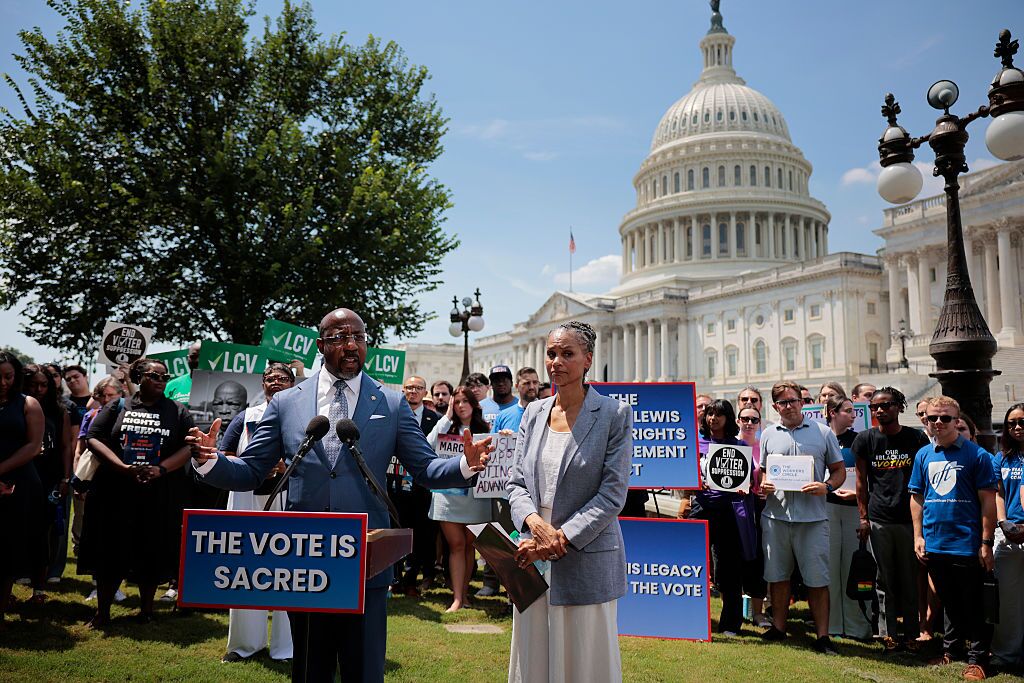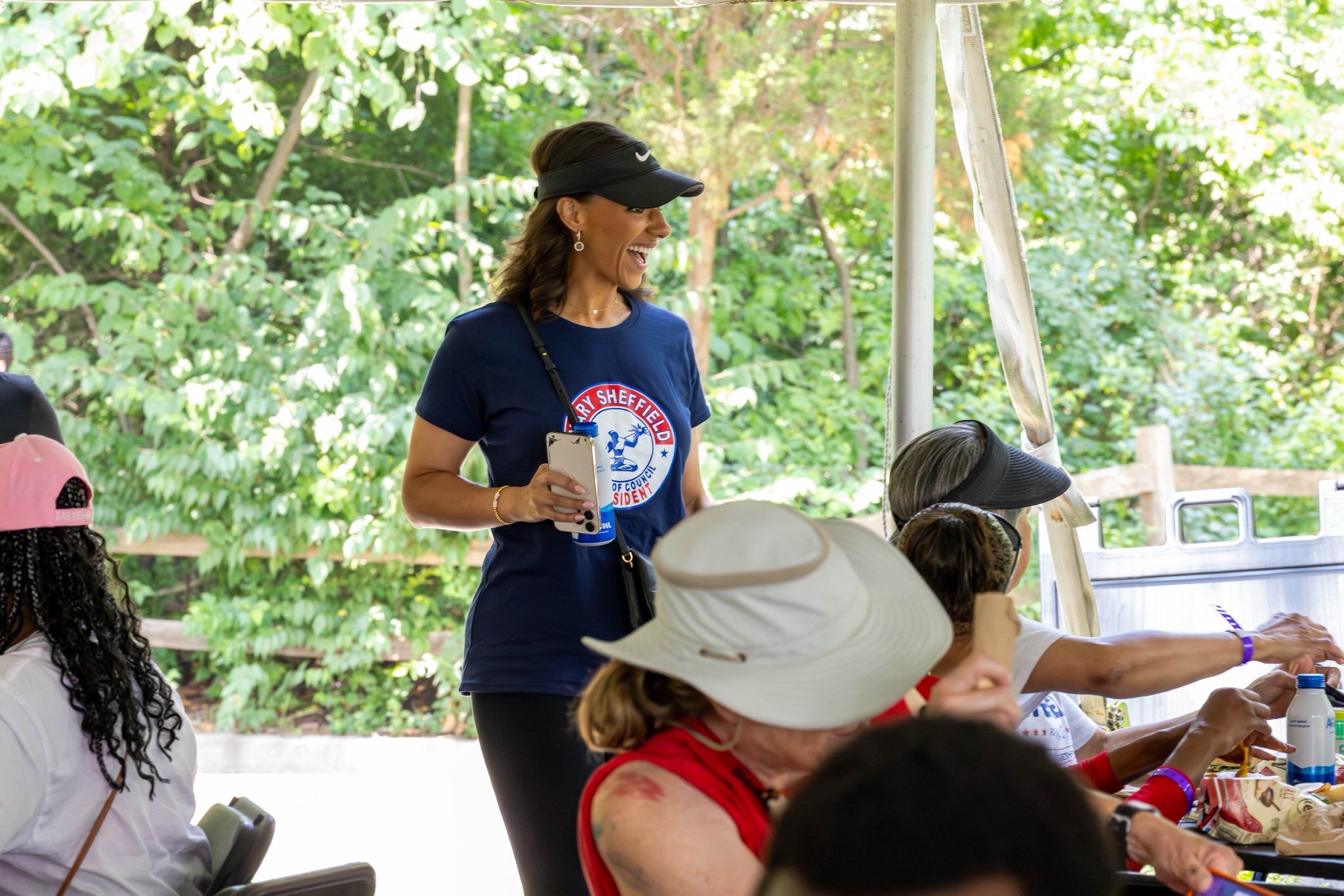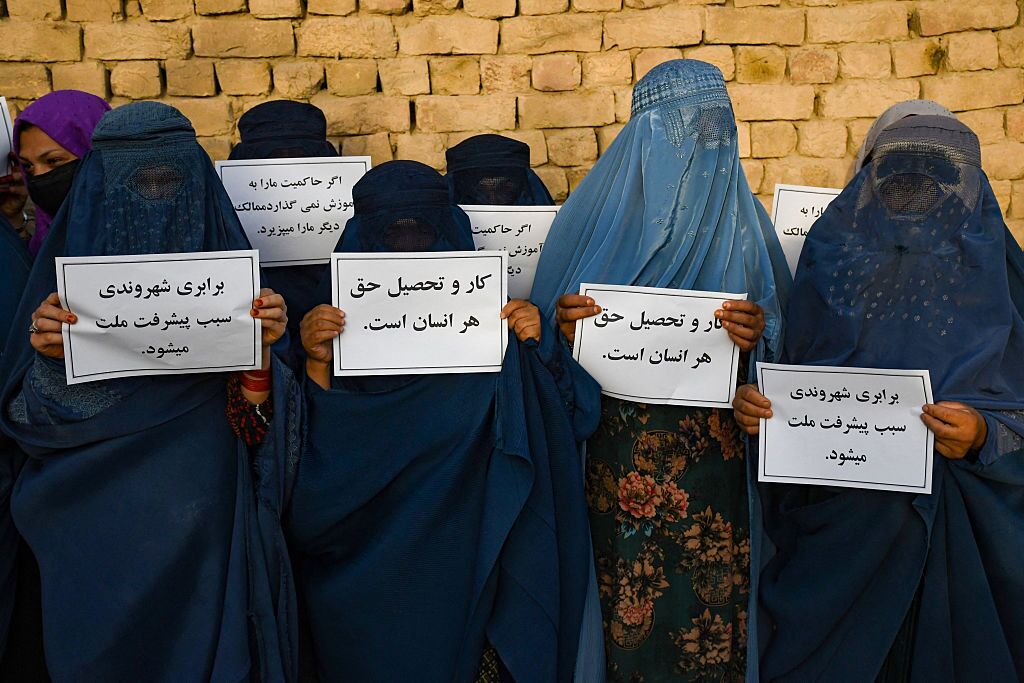Weekend Reading on Women’s Representation is a compilation of stories about women’s representation in politics, on boards, in sports and entertainment, in judicial offices and in the private sector in the U.S. and around the world—with a little gardening and goodwill mixed in for refreshment!
Sixty Years of the Voting Rights Act

This week marks the 60th anniversary of the Voting Rights Act, which was enacted on Aug. 6, 1965.
According to the National Archives, the VRA was designed to enforce the provisions of the 15th Amendment to the U.S. Constitution and “was signed into law 95 years after the amendment was ratified. In those years, African Americans in the South faced tremendous obstacles to voting, including poll taxes, literacy tests, and other bureaucratic restrictions to deny them the right to vote. They also risked harassment, intimidation, economic reprisals, and physical violence when they tried to register or vote. As a result, African-American voter registration was limited, along with political power.”
The VRA is a testament to the importance and impact of strategies that address underlying structural barriers faced by voters. The success of intentional policies like the Voting Rights Act grounds my belief that systems change is not only possible but necessary.
August Marks Swearing in Anniversaries for Supreme Court Justices Sotomayor, Kagan and Ginsburg
Additional milestones this week include the birthdays of these notable women: Mamie Bittner; first female member of the White House Correspondents Association Helen Thomas; former First Lady Edith Roosevelt; vice president of policy, engagement and impact at GoFundMe Amanda Brown Lierman; Dani James; Virginia gubernatorial candidate Abigail Spanberger; Ann Crocker Hefter; former Maryland Democratic Party Chair Kathleen Matthews; U.S. Rep. Sarah McBride; and Wendy Raymond, president of Haverford College.
Mary Sheffield Wins Detroit Mayoral Primary

According to this story from the Detroit Free Press, City Council President Mary Sheffield will advance to the general election this November, along with Rev. Solomon Kinloch.
Why Women at the Peace Table Matter

A new interactive report titled “Women’s Participation in Peace Seeking Processes” from the Council on Foreign Relations reveals a stark truth: Women hold just 8 percent of negotiator roles, 9 percent of mediator roles, and less than 5 percent of peace agreement signatories in major conflict resolutions since 1990, despite evidence that their inclusion improves outcomes dramatically.
The CFR notes:
Concerted efforts to increase the number of women in conflict prevention, mediation, and resolution efforts, include the passage of United Nations Security Council Resolution 1325 in October 2000, which “urges Member States to ensure increased representation of women at all decision-making levels in national, regional and international institutions and mechanisms for the prevention, management, and resolution of conflict.
UN Member States adopted this resolution because the evidence shows that higher levels of gender equality are directly related to increased levels of security and stability. In fact, women’s participation in conflict prevention and resolution can improve outcomes before, during, and after conflict. For example, women’s participation increases the probability of a peace agreement lasting at least two years by 20% and a peace agreement lasting fifteen years by 35%.
When women are at the table, peace is more lasting and inclusive. Agreements with women signatories are 35 percent more likely to endure for 15 years or more, and agreements shaped by diverse civil society, including women leaders, are 64 percent less likely to fail. In Colombia’s historic FARC peace negotiations, women helped secure provisions on victims’ rights, gender justice, land reform, and indigenous inclusion, while mediating cease-fires in their communities.
This issue goes beyond fairness; it is also about security and legitimacy. Women contribute diverse community insights, address the fundamental causes of conflict, and ensure accountability from parties involved. As U.N. officials highlighted during the 2024 Security Council open debate, excluding women damages both the sustainability and fairness of peace efforts.
Policy makers, mediators and civic leaders must do more than just meet quotas: they need to integrate women into leadership roles, strengthen women’s networks, support track II peacebuilders, and include gender-sensitive provisions in all agreements. Women’s involvement in peace processes is not only morally correct but also crucial for establishing sustainable democracy and lasting peace.
Jordan Breaks Records on Women’s Representation
In August 2024, the U.N. Resident Coordinator in Jordan hosted women-led civil society representatives to discuss the “Our Shared Responsibility” campaign, supported by U.N. Women and funded by the EU and AICS. Participants examined promising legal changes and barriers they face.
Jordan has reached a new milestone for women in politics: In its 2024 parliamentary elections, women won nearly 20 percent of the seats in the Lower House, up from 13.8 percent in the previous cycle. Backed by new electoral laws and targeted leadership training, the country has jumped 30 places in global rankings for women’s political representation.
Key reforms, mandating that political parties include at least 20 percent women and feature women among the top three candidates on party lists, are creating space for more women to run and win. At the same time, U.N. Women supported a new women’s political school, where more than 40 trainees ran for office and three won seats.
The results demonstrate that structural change is effective, but challenges still exist. Women in Jordan continue to face obstacles such as campaign finance inequality, gender-based harassment, and cultural resistance. Advocates emphasize that legal quotas must be complemented with long-term investments in safety, leadership development and political inclusion. Nonetheless, Jordan’s example provides hope: when systems are changed and women are supported, representation becomes a reality.
Iraq Launches First Women’s Political Party Ahead of Elections
In July 2025, Iraqi women made history by founding the al‑Mawadda Women’s Party, the country’s first-ever political party created exclusively for women. Led by activist Jihan al-Taei, the party, named for “compassion, love, and respect,” has gathered over 7,000 members without formal promotion and aims to amplify the voices of women from all sects and regions within a male-dominated political landscape.
Al‑Taei explained the motivation behind launching al‑Mawadda:
Women constitute more than half of Iraqi society. Our party was established due to the marginalised role of women and their genuine exclusion from all areas of life, especially from decision-making.
Despite provisions guaranteeing a 25 percent minimum quota for women in Parliament, Iraqi women have long struggled to convert representation into policy influence. Independent female candidates, in particular, face systemic intimidation, social stigma and barriers to campaign finance.
The launch of a women-led party marks a structural breakthrough, signaling a shift in women’s roles from tokenized quota positions toward collective, politically driven leadership rooted in their own agenda. It’s a moment that could reshape gender dynamics in Iraqi politics and push beyond symbolic progress.
Lawmakers Fight for ‘Potty Parity’: Restrooms at State Capitols Reveal Symbolic Gaps in Inclusion
Female legislators across the U.S., like the 41 women serving in Kentucky’s 138-member statehouse, are navigating antiquated facilities that were never designed for them. In Kentucky, women rely on just two bathroom stalls near chambers, forcing them to calculate restroom breaks around votes. Meanwhile, male colleagues benefit from multiple facilities, some of which are even outfitted with speakers, allowing them to continue watching debates while using the restroom.
Rep. Lisa Willner captured the sentiment well:
You get the message … this place was not really built for us.
Architect and scholar Kathryn Anthony echoed the broader stakes:
If you design an environment for half the population and forget about the other half, you create a population that feels disenfranchised.
Some states are acting. Kentucky is undergoing a $300 million Capitol renovation, including the addition of more women’s restrooms. Georgia is similarly expanding women’s facilities across its buildings. Others have devised creative workarounds in Colorado and New Mexico.
It’s not just an inconvenience; it’s a metaphor for deeper systemic exclusion. Women are increasingly held to participation standards in institutions that aren’t built to include them. As women make historic gains in representation, holding over 33 percent of state legislative seats nationwide in 2025, they demand not just presence, but respect and structural access. Ensuring equitable facilities is a basic requirement for equal participation. State capitol buildings are public institutions, and yet many feel antiquated, male‑designed, and exclusionary. Bringing in more restrooms is a symbolic and practical extension of gender equity in governance. As lawmakers press for change, they’re redefining what a truly inclusive institution looks like—a place that respects everyone, even during bathroom breaks.
Democratic Women Aim for 100 in 2027
A new analysis from The 19th profiles Elect Democratic Women (EDW), a PAC founded and led by House Democratic women, as it embarks on its boldest mission yet: to ensure 100 Democratic women serve in the U.S. House in 2027, capitalizing on the upcoming 2026 midterms. As of early August 2025, 94 Democratic women are serving (five of whom will retire or seek higher office in 2026), leaving space for strategic gains.
Through early recruitment, candidate training, fundraising, and a supportive network, EDW supports women who might otherwise be overlooked. Reps. Melanie Stansbury (N.M.) and Emilia Sykes (Ohio), for example, credited EDW with helping them navigate challenging early House races through strategic fundraising and community building from day one. The 19th writes on what has changed since being formed in 2018, and Rep. Lois Frankel (Fla.), a founding member of EDW, weighs in on their strategy going forward:
Women’s representation in Congress stalled in the 2024 election cycle. While a record number of Democratic women now serve in the House, the number of women sworn in to Congress in January fell for the first time since the 2010 midterms.
And Democratic candidates, especially women, are navigating a far different political climate than in 2018. President Donald Trump returned to power after being found liable for sexual abuse and running a campaign on an aggressive, ascendant vision of masculinity. Women and families have been hard hit by reductions to the federal workforce and Republicans’ party-line tax cut and spending legislation, which included sweeping cuts to programs disproportionately used by women and families. Democrats, meanwhile, are contending with poor approval ratings, are lagging behind their Republican counterparts in fundraising, and are at a crossroads as to the future of their party.
Frankel believes voters will “rise up” against Trump, who has seen his approval ratings drop to their lowest point since he took office in January, is underwater with voters on key issues and has recently been beset by infighting and discontentment within his base over his administration’s handling of files related to the case of the late disgraced financier Jeffrey Epstein.
Though the midterms will be a referendum on Trump, Frankel said it’s critical for Democrats to run on issues such as healthcare, caregiving, and affordability, including child care costs — issues important to voters, especially women.
More Women Are Managers, but Gaps Persist
A new report from the Pew Research Center titled “Women Are a Rising Share of U.S. Managers and Professionals” shows women now hold 46 percent of U.S. managerial roles, up from just 29 percent in 1980. They also account for 58 percent of professional jobs, reflecting significant gains in workforce leadership and income potential. Additionally, soft and social skills are more important than ever in managerial roles. As workplaces shift toward team-based models, negotiation, communication, and emotional intelligence give many women a leg up. Pew writes more on why women have made these gains:
A majority of managerial and professional workers have at least a bachelor’s degree. Women have been outpacing men in college completion for decades, and they now make up the majority of college-educated workers – 53% in 2023, up from 39% in 1980.
Another factor is the growing importance of social skills in managerial and professional jobs. Employees are increasingly working in teams, and managers are increasingly required to possess social skills to succeed. Studies have found that women tend to have an edge over men in jobs that require more critical social skills. Analyses of job skills in the U.S. often use O*NET, the U.S. Department of Labor’s survey of workers, employers, and experts that ranks detailed job tasks in many occupations. Social skills, also known as people skills, encompass various tasks such as negotiation, persuasion, communication, leadership, and social perceptiveness.
This advantage, however, still must be matched by structural support in recruitment, sponsorship, and promotion pipelines. Women dominate lower-paying fields, such as teaching, nursing, and social work, while still being underrepresented in high-paying sectors, including tech and engineering. The pay gap persists: Even in professional roles, women earn less than men, with vast gaps in male-dominated industries.
This matters particularly for democracy supporters because careers often serve as nurseries for leadership. When women advance into better-paying roles, they significantly influence public institutions, including schools, hospitals, local government offices, and corporate boards. Research consistently shows that women in leadership positions are more likely to advocate for policies related to public health, education, family leave and gender equity. As more women attain managerial power, those policy outcomes become more inclusive and representative of the communities they serve.
RepresentWomen Partners with Vote Mama at the National Conference of State Legislatures
Our team was in Boston this week for the National Conference of State Legislatures, sharing insights from the upcoming 2025 Gender Parity Index, a data-driven report that tracks how well each state is doing in electing women and where there’s still work to be done.
Views from the Pacific Northwest
Last week, after dropping my husband off near the border between Canada & the United States—to hike the Pacific Crest Trail—my dear friend Melinda Mann and I hiked to a beautiful waterfall and found views of Lake Ross.



That’s all for this week, my friends,
Cynthia
Great Job Cynthia Richie Terrell & the Team @ Ms. Magazine Source link for sharing this story.




